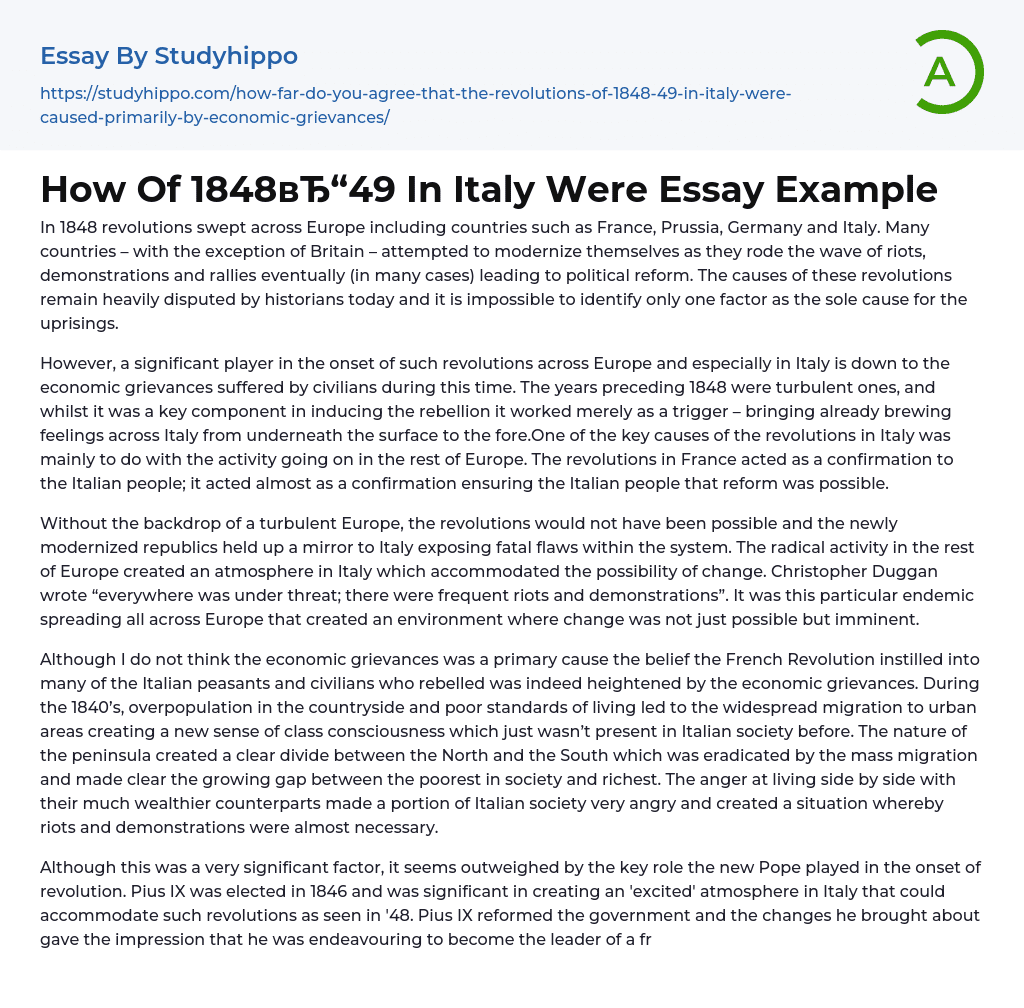In 1848 revolutions swept across Europe including countries such as France, Prussia, Germany and Italy. Many countries – with the exception of Britain – attempted to modernize themselves as they rode the wave of riots, demonstrations and rallies eventually (in many cases) leading to political reform. The causes of these revolutions remain heavily disputed by historians today and it is impossible to identify only one factor as the sole cause for the uprisings.
However, a significant player in the onset of such revolutions across Europe and especially in Italy is down to the economic grievances suffered by civilians during this time. The years preceding 1848 were turbulent ones, and whilst it was a key component in inducing the rebellion it worked merely as a trigger – bringing already brewing feelings across Italy from underneath the surface t
...o the fore.One of the key causes of the revolutions in Italy was mainly to do with the activity going on in the rest of Europe. The revolutions in France acted as a confirmation to the Italian people; it acted almost as a confirmation ensuring the Italian people that reform was possible.
Without the backdrop of a turbulent Europe, the revolutions would not have been possible and the newly modernized republics held up a mirror to Italy exposing fatal flaws within the system. The radical activity in the rest of Europe created an atmosphere in Italy which accommodated the possibility of change. Christopher Duggan wrote “everywhere was under threat; there were frequent riots and demonstrations”. It was this particular endemic spreading all across Europe that created an environment where change was not just possible but imminent.
Although I do no
think the economic grievances was a primary cause the belief the French Revolution instilled into many of the Italian peasants and civilians who rebelled was indeed heightened by the economic grievances. During the 1840’s, overpopulation in the countryside and poor standards of living led to the widespread migration to urban areas creating a new sense of class consciousness which just wasn’t present in Italian society before. The nature of the peninsula created a clear divide between the North and the South which was eradicated by the mass migration and made clear the growing gap between the poorest in society and richest. The anger at living side by side with their much wealthier counterparts made a portion of Italian society very angry and created a situation whereby riots and demonstrations were almost necessary.
Although this was a very significant factor, it seems outweighed by the key role the new Pope played in the onset of revolution. Pius IX was elected in 1846 and was significant in creating an 'excited' atmosphere in Italy that could accommodate such revolutions as seen in '48. Pius IX reformed the government and the changes he brought about gave the impression that he was endeavouring to become the leader of a free, united Italy. He granted commissions to analyse the judicial system confirming to the Italian people that changes did need to be made.
Press censorship was abolished allowing commentators to affect public opinion and a customs union was entered between Piedmont and Tuscany lowering and even eliminating tax for products traded between the two. These were drastic changes and will have induced thoughts of possibility and chance should a revolution take place
amongst many Italians.Despite the weight of argument suggesting that the root of many of he qualms Italians held with the state and the direct influence economic factors had on people's lives I do not feel that the cause of the 1848 revolutions can be put down primarily to that. I think the overriding factor is this atmosphere of change brewing in Italy at the time. Many might argue that the economic factor is a contributor to this, but I feel it was the actions of the Pope and the activities taking place all across Europe that are the main causes. If the Pope were not to assume power in 1846 and carry out the 'radical' changes he did instilling a sense of belief into many reformers who finally believed that modernization was not a dream but entirely possible, I do not think the revolutions would have gathered such momentum and involved key areas within Italy.
The economic grievances cannot be discredited as a contributing factor however it is not a determining one.
- Cuban Missile Crisis essays
- Fidel Castro essays
- French Revolution essays
- Han Dynasty essays
- Hiroshima essays
- Imperialism essays
- Jack The Ripper essays
- Mao Zedong essays
- Middle Ages essays
- Mongols essays
- Nelson Mandela essays
- Ottoman Empire essays
- Reformation essays
- Reign of Terror essays
- Renaissance essays
- Roaring Twenties essays
- Romanticism essays
- Samurai essays
- Scientific Revolution essays
- Soviet Union essays
- Athens essays
- Belgium essays
- Berlin essays
- British essays
- England essays
- Germany essays
- Great britain essays
- Greece essays
- Ireland essays
- Italy essays
- London essays
- Paris essays
- Pompeii essays
- Rome essays
- Russia essays
- Spain essays
- United Kingdom essays




